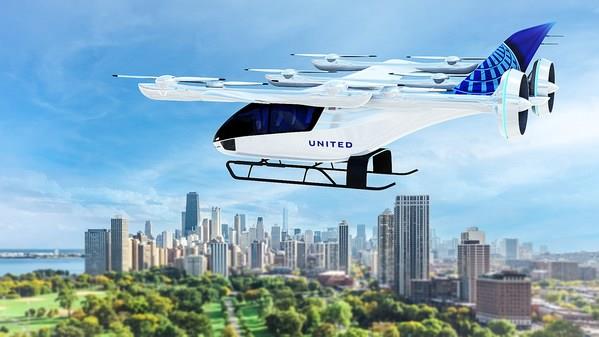United announced a US$15 million investment in Eve Air Mobility and a conditional purchase agreement for 200 four-seat electric aircraft plus 200 options, expecting the first deliveries as early as 2026.
This marks another significant investment from United in flying taxis – or eVTOLs (electric vertical take-off and landing vehicles).

Photo: United Airlines
In a statement, United said under the terms of the agreement, the companies intend to work on future projects, including studies on the development, use and application of Eve's aircraft and the urban air mobility (UAM) ecosystem.
"United has made early investments in several cutting-edge technologies at all levels of the supply chain, staking out our position as a leader in aviation sustainability and innovation," said Michael Leskinen, president of United Airlines Ventures. "United is making history again, by becoming the first major airline to publicly invest in two eVTOL companies."
Leskinen noted that the agreement with Eve highlights the carrier's confidence in the urban air mobility market and serves as another important benchmark toward our goal of net zero carbon emissions by 2050 – without using traditional offsets.
United noted that it is the first major US airline to create a corporate venture fund, United Airlines Ventures (UAV), designed to support the company's 100% green commitment to reach net zero emissions by 2050 without the use of traditional offsets.
Through UAV, United has led the industry in investments in eVTOL and electric aircraft, hydrogen fuel cell engines, and sustainable aviation fuel. Last month, United gave a US$10 million deposit to a California-based eVTOL company for 100 aircraft.
United said the investment in Eve was driven in part by confidence in the potential growth opportunities in the UAM market and Eve's unique relationship with Embraer, a trusted aircraft manufacturer.
"Critically, their relationship includes access to Embraer's service centres, parts warehouses and field service technicians, paving the way for a reliable operation. Upon entry into service, United could have its entire eVTOL fleet serviced by Eve's agnostic service and support operations," United said.
Rather than relying on traditional combustion engines, eVTOL aircraft are designed to use electric motors, providing carbon-free flights and to be used as 'air taxis' in urban markets.
Eve's design has a range of 60 miles (100 km), and its vehicle has the potential not only to offer a sustainable commute but also to reduce noise levels by 90% compared to current conventional aircraft.



